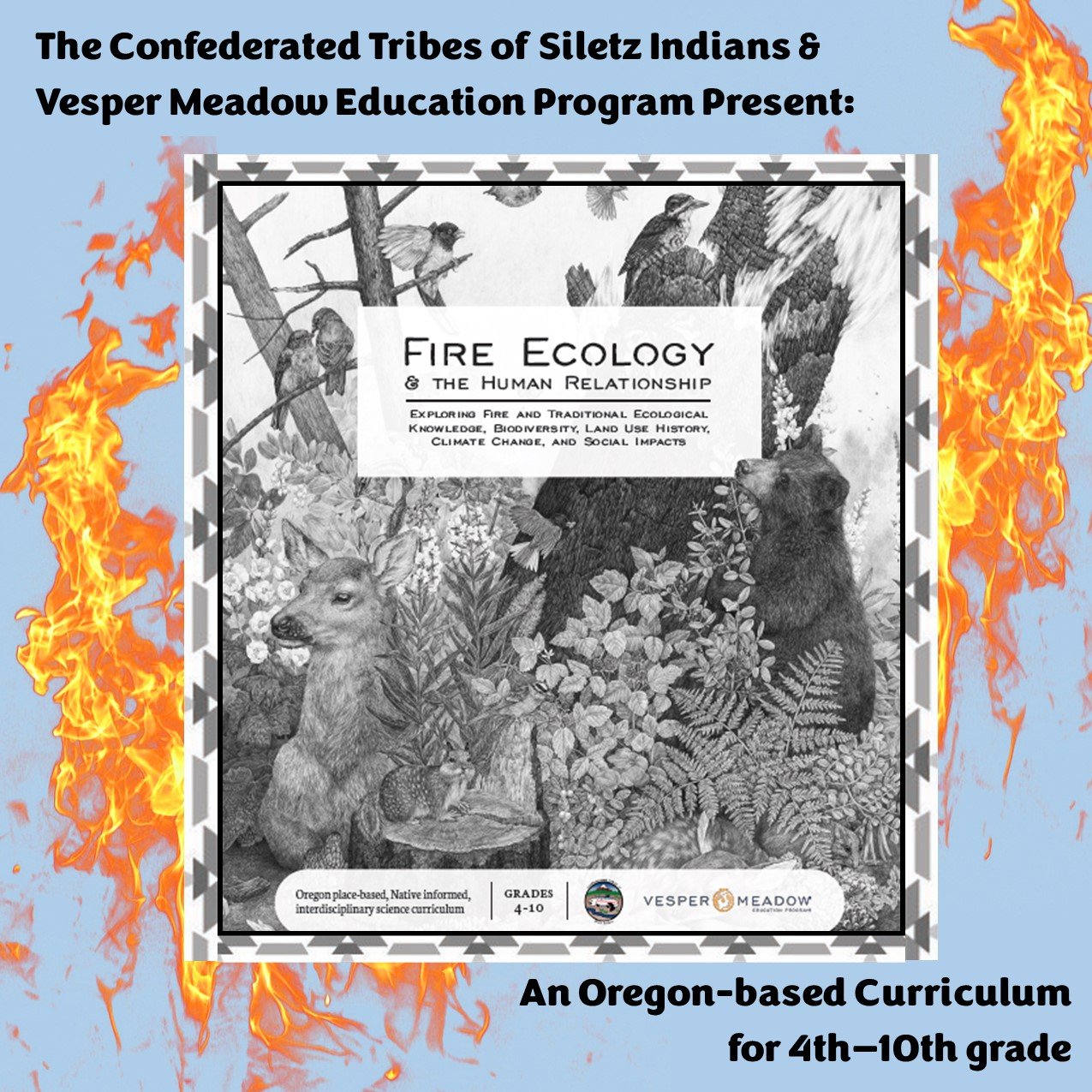Our Hottest Item this Year: the Fire Ecology and Human Relationship curriculum
One of our biggest accomplishments this year was launching the Fire Ecology and Human Relationship Curriculum. We worked on this project with the Confederate Tribes of Siletz Indians for three years and are glad now to be sharing it with teachers and the public. Here’s an overview of the curriculum and its debut:
The Fire Ecology and the Human Relationship Curriculum:
an Oregon-centric, Native-informed, interdisciplinary science curriculum for 4th - 10th grade. These 11 lessons are designed for teachers and students to explore fire and its connections with Traditional Ecological Knowledge, biodiversity, land-use history, climate change, and social impacts.
The curriculum is intended to expand upon existing wildfire curricula that are more general to lands of the American West and emphasize settler / industrial perspectives. This Oregon-based curriculum covers fire’s connections with biodiversity, Indigenous culture, land management history, climate change, and social impacts today. We hope to provide both classroom and informal educators a foundation to effectively teach about the role of fire in Oregon’s ecosystems, how humans have interacted with fire past and present, and engage students to think critically about solutions for a fire-adapted future. Read more about the curriculum and see the free download link here.
Our first debut with educators around the Pacific Northwest
Thanks to Oregon State University’s ONREP program, we hosted our first educators workshop November 14th and 16th this year and the RSVP filled immediately! With over 30 people on the waitlist, we held the workshop for 55 teachers and non-profit educators from around Oregon, Washington, California, and even a couple from Canada. Educator training was enriched by guest speakers Joseph Scott, Siletz Tribal member, Educator and Cultural Fire Practitioner who spoke about the cultural and ecological importance of fire in Oregon as well as Chris Adlam, OSU Extension Fire Specialist who spoke about trends in wildfire throughout Oregon (recording available here). Teachers were led through a number of lessons and discussed the classroom use of the associated games, art, powerpoints, and other lesson materials. In the feedback after the workshop event, ONREP told us that it went remarkably well, and that it was received well by participants because it may have been the first time where everyone who participated in part 1 of the workshop also returned for the part 2 of the workshop (two days later).
All good things come from collaborative efforts:
Many thanks to the people who have provided support, research, time, and care for the creation of this curriculum:
Funding for production was made possilbe by the Confederated Tribes of Siletz Indians with support from the Roundhouse Foundation, Gray Family Foundation
Further support for printing and outreach was provided by the Gray Family Foundation and the Jackson County Soil and Water Conservation District (*as of the time of this blog posting, we are seeking further funding to be able to hold more teacher workshops and get this in to more classes around the State of Oregon)
Written by the Vesper Meadow Education Program: Jeanine Moy and Brian Geier
Edited by: Joseph Scott, Nancy Austin, Debra Agnew, Chris Adlam, Robert Kentta, Peter Hatch, Stasie Maxwell, Katie Boehnlein, Tara Laidlaw
Art: Zoe Keller, Sarah F. Burns
What teachers are saying about the curriculum:
This is revolutionary curriculum compared to what's been the standard in nature education that I've encountered, thank you all so much for your efforts.
ONREP teacher workshop participant, November 2023
The ONREP & Vesper Meadows online sessions on Fire Ecology and the Human Relationship (FEHR) was an extraordinary learning experience. As one familiar with Oregon’s recently upgraded NGSS Science Standards and the greater emphasized Climate Science, the FEHR keynote speakers and the follow up breakout sessions ideas, discussions and educational resource references were totally aligned with NGSS and Oregon Climate Science standards. It was a great PD event.
Artemio Paz, former chair of Oregon State Board of Education
Thank you all so much for this wonderful training and beautiful curriculum! I know how much work it must have been, and it is a wonderful resource for teachers and educators. It plays an important role in moving ITEK forward.
Jennifer Payne, Education Program Manager for Southern Oregon Forest Restoration Collaborative
I’m thrilled with it! I’ve learned so much from it… and I’ve been in the fire service (EMT, firefighter, administration) for 39 years. So, THANK YOU VERY MUCH!
ONREP teacher workshop participant, November 2023

